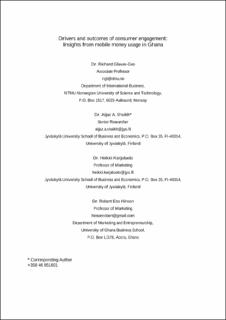| dc.description.abstract | Purpose – The purpose of this study is to examine the drivers of consumer engagement and its consequences via the experiences of mobile money services’ users in Ghana, and to discuss its implications for the society, financial service innovation, delivery, and operations.
Design/methodology/approach –A pre-tested survey instrument was used with a sample of 595 mobile money services users in Ghana. SmartPLS application was used to analyse the data and report findings.
Findings –The study shows that perceived risk, consumer empowerment, subjective norm, performance expectancy, and effort expectancy influence the affect component of consumer engagement and explain around half of its variance. The effect of perceived risk on consumer engagement was counterintuitive. Perceived risk was significant and positive for cognitive processing, whereas the effect was significant but negative for affect. The authors found support for the positive effect of cognitive processing on advocacy intention but no support for its effect on continuous usage. By contrast, affect strongly influenced both advocacy intention and continuous usage of mobile money services.
Practical Implications - We highlight the implications of mobile money services to business and marketing/service managers, policymakers, non-banking entities (such as telecoms and financial technology firms), and to the society in general. We provide important insights into how service providers can manage consumer engagement process and formulate marketing strategies to target and promote this simple, but innovative service to consumers. Moreover, we discuss the societal implications of our study in Ghana, a developing country. We recommend several options for future studies in order to stimulate the research agenda on mobile financial services in general.
Originality/value – The present study shows that although mobile money was initially introduced to help consumers who hitherto have no access to formal banking services, this form of banking has become increasingly popular among various consumer segments as its usage and adoption has increased multifold largely in emerging and developing countries. The main contribution of this study is the development and testing of the ‘mobile money customer engagement model.’ Moreover, this study shows the key factors that influence the engagement process and the effects of these factors as analyzed within the context of a developing country. | en_US |
